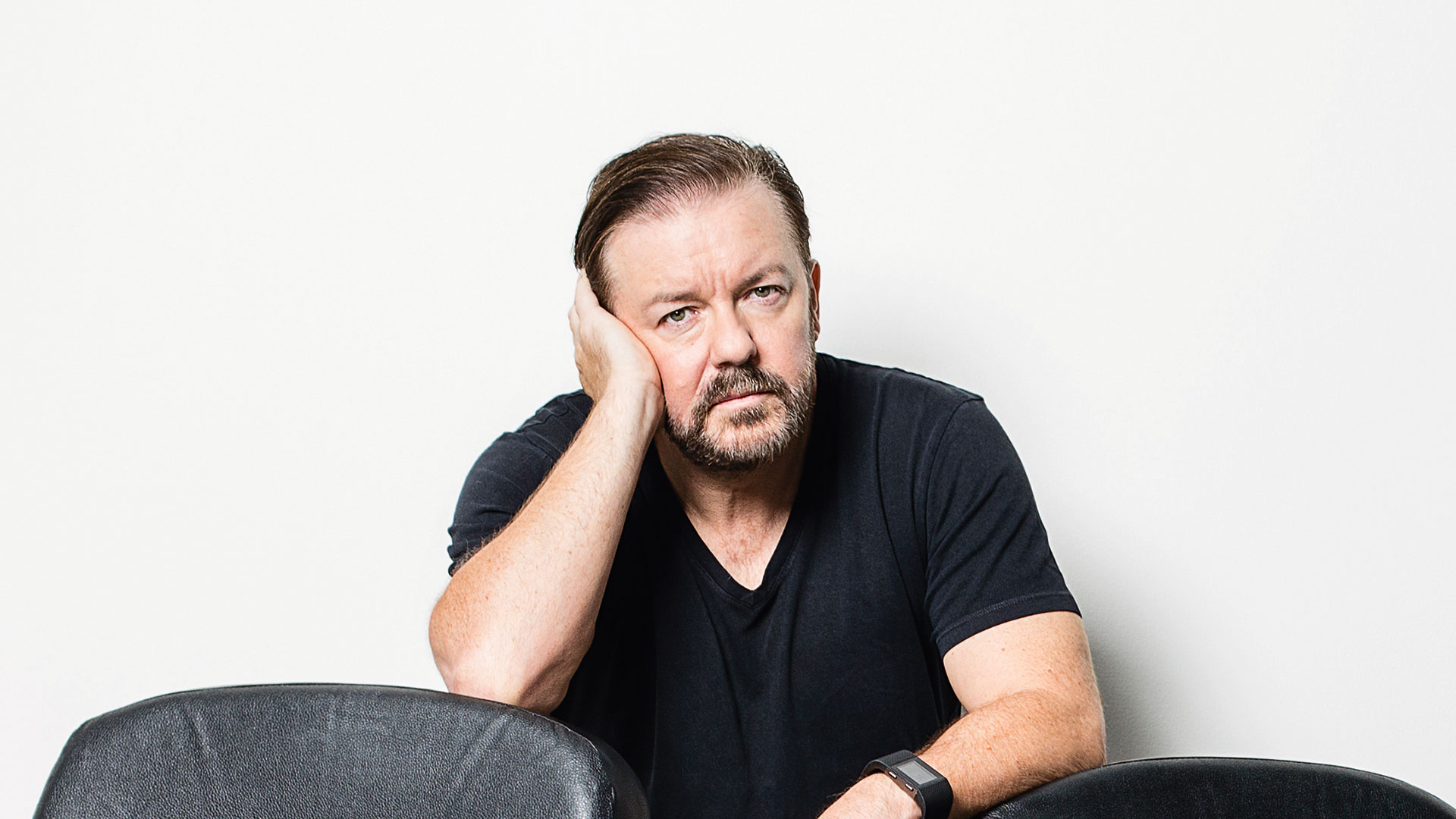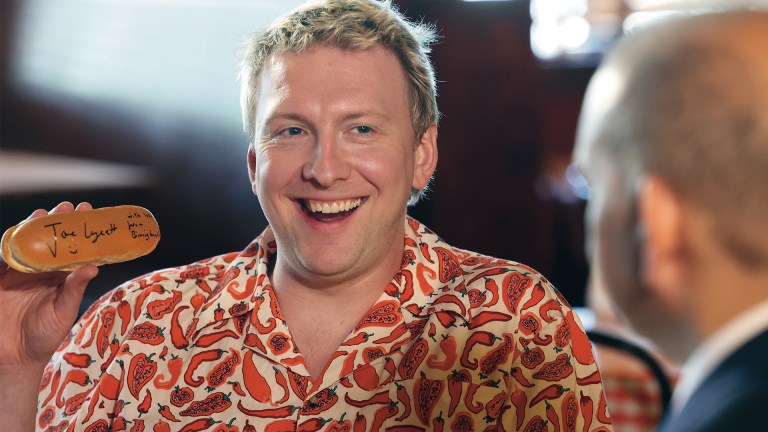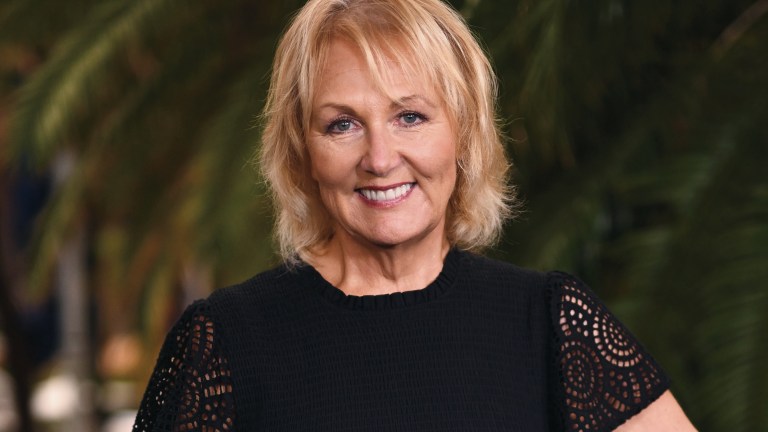The show was retooled for the US and ran for a staggering nine series, clocking up 201 episodes, with Gervais himself making a cameo in two of them. Since 2001, he has been inexhaustible, using The Office to lead into a hugely productive career that includes Extras, Life’s Too Short, The Ricky Gervais Show, An Idiot Abroad, Derek, Cemetery Junction, his own stand-up shows, iconoclastically hosting awards shows (such as the Golden Globes), podcasting and the Flanimals books. It’s clear he has been making up for lost time.
It’s hardly milking it as it’s nine-and-a-half hours of David Brent in 15 years
He says he can occasionally return to Brent away from Wernham Hogg – like appearing on Comic Relief in 2013 – but has no desire to rehash the show, choosing instead to put him in new contexts.
Stephen Merchant, Gervais’ co-creator on The Office and Extras, is not involved with the Brent film, reinforcing the idea that Brent can exist outside of the hermetically sealed world of The Office, thereby meaning the show – much like Fawlty Towers and Father Ted – retains its sacrosanct nature by not being overegged or being subjected to an extra, and unnecessary, series just to chase ratings.
He remains unconcerned at accusations of coasting by returning to Brent intermittently. “It’s hardly milking it as it’s nine-and-a-half hours of David Brent in 15 years,” he says. “There is still more to find out. How well do you know someone after nine-and-a-half hours?”
In as much as the film is a return to Brent, it’s also a comment on the nature of the reality TV format and how it has gone from a position of benign naivety at the turn of the millennium to pernicious cruelty in the misguided pursuit of fame. “It’s no longer people getting their 15 minutes of fame and being happy with it,” he says of this cultural shift. “Now it’s people living their lives like an open wound 24/7.”
Advertising helps fund Big Issue’s mission to end poverty
The need for fame, and the validation he is convinced it will bring him, is still chewing at Brent; he cashes in his pensions (plural) and takes 11 days of unpaid leave to fund his band, Foregone Conclusion (above), trying to make it. Except he massively overspends and ends up £20,000 out of pocket. That shift in documentary culture and the climate of fame is dissected in the film, with back references to Brent’s weight gain and six months on Prozac. “Documentary has changed and is more intrusive,” he says. “Now they start with the breakdown.”
Gervais feels this adds more pathos to the character of Brent, seen most explicitly where he pays his band, who can barely tolerate him, to come to the pub with him. He also attempts to pick up two girls, one of whom spends the night in his hotel but only because her own flat is being renovated, so she powers through his mini-bar and leaves him sleeping on the sofa.
“Brent is all about peer pressure,” suggests Gervais. “He tries to please but is caught between two worlds all the time. He wears a T-shirt with a cannabis leaf on it but he’s scared really. He’s scared he’ll be on heroin in a week.”
The point of Brent is essentially about a good man loaded down with frustrated ambition, getting older and watching his shot at fame limp over the horizon. He can never achieve it but equally can never give up the chase. Gervais says he will occasionally revisit him but knows that it will become more excruciating the older he gets.
“With Brent, I’ll embrace his age,” he says. “But it might be too tragic to see him at 65 still trying to make it. As delusional as he is, I think it’s a front. It’s a defence mechanism. I think he goes home and cries sometimes. I always wanted people to know that the prat in the office might cry.”
Gervais himself achieved what Brent craves most – fame and success after a lot of false starts – but did so later in life and he feels this mitigated against it defining, consuming and destroying him. “I was 39 [when I became famous] so I knew who I was,” he argues. “My values didn’t change. My friends didn’t change. I just had more money and people recognised me. When I went into it, because I was a little bit older and wiser than some, I could treat it with some contempt. It never meant anything to me.”
Advertising helps fund Big Issue’s mission to end poverty
The Faustian pact of fame gets crueller with each passing year for the mid-ranking celebrity, he feels, and now it is less about ambition and more about contrition. Brent allows him to sketch that all out. “You can see he’s a bit more nervous about fame and he’s making the mistakes that every D-lister makes,” he says of this incarnation of Brent. “They have fallen from grace and they are hoping they can change the public’s opinion of them. Why? Fuck the public.”
I always wanted people to know that the prat in the office might cry
That said, his fame has brought him into the orbit of most of his heroes, notably David Bowie, who appeared in an episode of Extras. He first met him at a BBC event just as The Office was taking off but Bowie was aware of who he was. Someone in Bowie’s team got him a copy of The Office and two weeks later he contacted Gervais. “He got my email address,” says Gervais, still visibly amazed that it happened. “The subject was ‘The Office’ and it just said, ‘I watched. I laughed. What do I do now?’ We became pen pals.”
They would meet when Gervais was in New York, visiting him in his apartment. “We went into the building and the concierge went, ‘Ah, you’re here to see Mr Jones’,” he recalls. “And I thought, of course I’m going to see Mr Jones. David Bowie doesn’t exist. He just had his heart operation [in 2004] and he was getting better. He asked if we wanted coffee, went off to make it and then came round the corner [leaps up to illustrate this, miming holding a tray and shuffling like Mrs Overall in Acorn Antiques]. Hah hah!”
His apartment was “like something out of a magazine”, says Gervais, but it was also a home. “There was an amazing sculpture, weird distorted thing that looked like a Picasso. He said [note-perfect impression], ‘Yeah, it’s like a Picasso but the artist was trying to do what Picasso did in 2D to make something look 3D – but actually doing it in 3D. Anyway, my daughter likes to hit that with a hammer!’”
I tell him that Bowie’s favourite word was, apparently, “cunt” and he squawks with laughter. “He was amazing – a smart, gentle, lovely man,” he says. “On his 57th birthday, I sent him an email. ‘57! Isn’t it about time you got a proper job? Ricky Gervais, 42, comedian’. He sent back, ‘I have a proper job. David Bowie, Rock God’. That’s amazing.”
David Bowie was amazing – a smart, gentle, lovely man
Another positive byproduct, Gervais feels, of fame is that he can use his Twitter account to tell his 11.4 million followers about animal rights issues, his overriding passion. “The best thing about Twitter is that it can help change things,” he says. “A decade ago it would take you years to get 100,000 signatures [for a petition] standing outside Tesco. Now you can do it in a few days.”
Advertising helps fund Big Issue’s mission to end poverty
I ask him if he’s worried that he might “go a bit Morrissey” and lose perspective, arguing that mass shootings are not worse than KFC. He says he only goes “after the very worst things”, such as dogs being skinned alive for their meat or bull fighting for entertainment. “When a matador gets killed, I go, ‘Good – the silly cunt’,” he says brusquely. “If you don’t know why it’s wrong to torture a bull, then there’s no hope for you.”
As I leave, Gervais heads to the bathroom but abruptly turns on his heels. “I didn’t go on about Bowie too much, did I?” he asks, perhaps concerned about name-dropping or revealing too much about a private man by letting light in on magic. If anything, I say, he probably didn’t go on about him as much as I would have liked. “You’re right,” he decrees. “You can never talk about David Bowie enough.”
David Brent: Life on the Road is in cinemas from now
Ricky Gervais was photographed for The Big Issue by Louise Haywood-Schiefer










